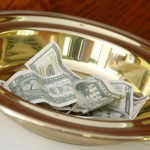NASHVILLE, Tenn.—After a few years of economic optimism, pastors say the 2020 economy is hurting their congregation.
According to a new LifeWay Research survey, about half of Protestant pastors in the United States (48 percent) say the current economy is negatively impacting their church, including 5 percent who say the impact is very negative.
Around 1 in 6 (15 percent) believe the economy has had a positive effect, including 4 percent saying it is having a very positive impact. More than a third of pastors (35 percent) say there’s been no impact.
Even with a 12-point jump from 2018 to 2019 (14 percent to 26 percent), perceptions of negative impact had been trending downward since 2010 when 80 percent of Protestant pastors said the economy was harming their church.
The 2020 negative numbers are the highest since January 2016, when 51 percent of pastors said the economy was hurting their church.
“The recovery from the last recession was slow for many churches,” said Scott McConnell, executive director of LifeWay Research. “Even in a good economy, it can be easy to focus on external factors that are hurting your church’s finances. Clearly, many pastors are seeing the recession in 2020 impacting their church.”
Giving levels flat or down
Most Protestant pastors say giving has been at or below 2019 levels, as well as at or below their budget for this year. Around a third report giving levels lower than last year and lower than their current budget.
For close to half of churches (45 percent), giving in 2020 has been about what was budgeted. A third (33 percent) say it is lower than budgeted, while 21 percent say giving has been higher.
When compared to 2019, 35 percent say giving has dropped this year, 32 percent say it is the same, and 29 percent say it is above last year’s levels.
Sign up for our weekly edition and get all our headlines in your inbox on Thursdays
Those numbers accelerate a downward giving trend that began last year.
In 2018, LifeWay Resarch found 42 percent of pastors said their offerings were up, 37 percent said giving was the same, and 15 percent said it was below 2017.
Those numbers worsened slightly in 2019 when LifeWay Research found 37 percent said giving was up, 37 percent said it was the same, and 21 percent said it was below 2018 levels.
“2018 looks like as good as it gets for positive economic impacts for churches,” McConnell said. “People quickly got used to improved take-home pay from tax changes and were seeing flat wages meaning 2019 was more difficult for churchgoers to maintain 2018 giving. Now in 2020, a recession brought on by the COVID-19 pandemic has set a third of churches behind their 2019 giving.”
When asked about the specific percentage change from 2019 to 2020, 8 percent of Protestant pastors say their giving is down by 25 percent or more, 18 percent say it dropped between 10 percent and 24 percent, and 7 percent say it was a small drop of 1 percent to 9 percent.
 Of those who say their giving increased in 2020, most say it went up a small amount. Around 1 in 8 pastors (12 percent) say giving was up by less than 10 percent, while 13 percent say giving was up between 10 percent and 24 percent. Few (3 percent) say giving at their church increased by 25 percent or more this year.
Of those who say their giving increased in 2020, most say it went up a small amount. Around 1 in 8 pastors (12 percent) say giving was up by less than 10 percent, while 13 percent say giving was up between 10 percent and 24 percent. Few (3 percent) say giving at their church increased by 25 percent or more this year.
Some feel the pain more than others
Some churches are faring worse in giving than others in 2020. Minority led, mainline and smaller congregations are more likely to say they’ve felt the brunt of the declining economy.
African American pastors are the most likely to say the economy is having a very negative impact on their church (20 percent).
African American pastors also are more likely to say their giving is lower than budgeted (48 percent) and below 2019 levels (50 percent) than white pastors, among whom 31 percent report giving below budget and 34 percent who say offerings are down from last year.
Evangelical pastors are more likely than their mainline counterparts to say giving in 2020 is higher than budgeted (23 percent to 14 percent). Similarly, evangelical pastors are more likely than mainline pastors to say giving is above 2019’s offerings (32 percent to 19 percent).
Pastors of churches with worship service attendance of 250 or more are more likely than pastors of churches with fewer than 50 people to say their giving is up from 2019 (32 percent to 23 percent)
“The economic impact of COVID-19 has been very uneven, and that includes churches,” said McConnell. The types of churches most likely to be struggling financially are also the most likely to have not gathered in person recently, he observed, based on other research.
“The exception is larger churches, but they were most likely to have less than 30 percent of their pre-COVID attendance in person.”
The mixed mode survey of 1,007 Protestant pastors was conducted Sept. 2 to Oct. 1, using both phone and online interviews. Each survey was completed by the senior or sole pastor or a minister at the church.
Analysts weighted responses by region and church size to reflect the population more accurately. The completed sample is 1,007 surveys (502 by phone, 505 online). The sample provides 95 percent confidence that the sampling error does not exceed plus or minus 3.4 percent. This margin of error accounts for the effect of weighting. Margins of error are higher in sub-groups.














We seek to connect God’s story and God’s people around the world. To learn more about God’s story, click here.
Send comments and feedback to Eric Black, our editor. For comments to be published, please specify “letter to the editor.” Maximum length for publication is 300 words.